Crédito: fuente
In Chicago, postal employees say backlogged mail is stacked so high in some facilities that workers barely have space to walk by. In Albuquerque, New Mexico, mail handlers tell NBC News first class and priority mail is still running several days a week behind schedule on average.
And in Tacoma, Washington, multiple postal workers said new mandates mean many mail trucks per week are being ordered to set out on their routes five minutes early — often entirely empty.
One week after Postmaster General Louis DeJoy announced he was temporarily suspending changes to the United States Postal Service, NBC News spoke with eight postal union representatives from throughout the nation, all of whom expressed concerns and provided examples of ongoing delays in mail delivery. They said the recent removal of hundreds of postal sorting machines and rigid new operational directives for mail trucks and carriers have exacerbated the slowdown.
“I’ve never seen anything like it,” said Keith Richardson, president of the American Postal Workers Union, Chicago, Local 1, and a post office veteran who’s worked 28 years as a mail processing clerk.
Postal workers associated with unions — seven of which represent nearly half a million workers — say their organizations offer them some protection to speak openly about the problems. Union leaders seeking to protect workers’ livelihoods and overtime may have an interest in being critical of DeJoy over fears that the Postal Service could be privatized and their bargaining position reduced.
“Some stations have so much mail backed up, it’s three times more than the volume you would see at Christmas,” Richardson said, noting Chicago’s International Military Service Center and Henry McGee Postal Station are particularly overwhelmed. “You can’t even walk down the aisles. It’s a wonder carriers can get in and out.”
While DeJoy announced last week he would put a halt to the removal of any more postal sorting machines and mailboxes until after the election, postal workers say he failed to lift a series of recently implemented postal mandates that include a system that requires trucks to leave facilities at specific times, even if vehicles and mailbags have not been fully loaded.
And while Postmaster DeJoy said in Congressional hearings that he did not direct the elimination of overtime, postal workers NBC News spoke with say overtime in many locations was still not being allowed, only approved on a case by case basis, or limited to only one to two hours. The Postal Service tells NBC News that overtime is still being granted and did not comment specifically on reports that some postal workers are being refused overtime. Instead, they referred to DeJoy’s comments and the Office of the Inspector General report on the issue.
As a result, Richardson and other postal workers NBC News spoke with say many postal facilities across the country remain backlogged and delivery in some locations has ground to a virtual halt, with mail carriers often forced to stop work for the day before all mail has been delivered.
“You have customers used to getting letters six days a week getting only one delivery a week now,” Richardson said, adding customers served by Chicago’s Robert Leflore station are experiencing some of the city’s worst delays.
In Albuquerque, Ramona Chavez, vice president of the American Postal Workers Union, Local 331, reports similar problems.
“We have more packages in our facility right now than we do at the holidays,” she said, noting even priority mail packages are being delivered several days late. “We have a mail handler group on Facebook and we’re all reporting the same thing. We’re all understaffed. Everybody’s just doing everything they possibly can. Delays are our new normal.”
Making matters worse, according to postal employees, are new mandates that have been handed down in some facilities, ordering postal drivers to set out on their routes early.
Bob Bockman Jr. is a tractor trailer operator for the Postal Service and a vice president of the American Postal Workers Union, Local 298, in Washington. He said he was stunned when he and his colleagues, who transport mail between Tacoma and Seattle, were given a new directive this summer, instructing them to depart with their trucks five minutes earlier than they’re officially scheduled to leave. Bockman said he’s been told by the plant manager in Tacoma that the new orders are coming from the national Postal Service operational leadership.
“Five minutes early is the new On Time,” the mandate, obtained by NBC News, reads. As a result of new early departure directives, Bockman said that he’s leaving facilities with entirely empty trailers four times a week.
“It’s chaos. It’s made a bad situation worse,” he said. “Any time you are rushed into something, people are going to make mistakes and mail is going to be left behind.”
Edra Haecherl, an assistant supervisor tractor trailer operator for the Postal Service based in Tacoma, said she has seen the empty trailers firsthand. “Seven tractor trailers come back empty each day” when usually they would have been carrying mail, she said. “This is not normal.”
NBC News reached out repeatedly to the USPS for comment regarding photos from Washington State postal facilities showing directives to leave five minutes early. In response to questions about the directive and reports that multiple postal trucks are setting out on their routes empty, national Postal Service representatives responded: “Postmaster General Louis DeJoy has implemented … steps to improve efficiency since taking the reins as Postmaster General in June 2020 … Requiring trucks to run on-time and on-schedule.”
According to Don Cheney, office manager of the American Postal Workers Union, Local 298, which represents the Puget Sound area, the new truck policies are a departure from the decades-old “15 minute leeway policies” in which postal trucks would routinely leave up to 15 minutes after their scheduled departure times in order to make certain all mail was gathered. Moreover, he said, the early departures are resulting in precious cargo often being left behind on loading docks, including live animals.
“The trucks have been told to leave no matter what, even if there are live animals in 100 degrees, sitting on that dock.»
“The trucks have been told to leave no matter what, even if there are live animals in 100 degrees, sitting on that dock,” he said. “We have crickets and worms, chicks and all kinds of live animals that are shipped through the mail, and when they’re left on that hot dock, they bake. These animals used to get top priority. We never used to leave them. The agricultural people depend on us because FedEx and UPS won’t deal with live animals.”
Cheney said just as concerning is the removal of hundreds of mail sorting machines throughout the nation in recent weeks.
In Tacoma, Cheney said only one letter sorting machine was slated to be removed by the Postal Service this summer because of reduced mail volume, which is the reasoning given by the Postal Service for other machine removals in the past. He said his team was informed of the removal in a memo from a Tacoma Plant Manager Charles DiCarlo dated June 6. Cheney said he and other Tacoma postal workers were stunned when four letter-sorting machines, each of which is capable of sorting up to 35,000 pieces of mail in an hour, were removed.
NBC News reached out to DiCarlo but did not immediately receive a response.
Last week, Tacoma postal maintenance workers were given authorization by Kerry Walton, maintenance manager for the Seattle Processing and Distribution Center, to reinstall two of the sorting machines that had been taken offline. Walton told NBC News he could not speak to the status of the machines because he is not officially authorized to speak about the issue.
But Cheney said Tacoma is still down a total of two sorting machines, and no one is telling his team why an additional sorting machine was decommissioned.
“We don’t know why they told us they’d take one machine and then took more. It’s like they don’t know what they’re doing, like they’re flying by the seat of their pants,” he said. “We’re not privy to what their thinking is. We’re all like mushrooms, being fed fertilizer but kept in the dark.”
NBC News reached out to the Postal Service repeatedly to find out why the extra machines in Tacoma were removed but did not receive an answer.
Postal workers in Texas, Pennsylvania and Indiana expressed similar frustrations about the recent removal of sorting machines.
According to Yared Wonde, president of the Dallas chapter of the American Postal Workers Union, the greater Dallas area has lost a total of 12 postal sorting machines in recent weeks.
Last week, after DeJoy announced plans to cease the removal of more sorting machines until after the election, maintenance workers in Dallas attempted to reinstall some of the sorters that had been taken offline, but were surprised to find that in four of the machines, the readers — software that make the reading of the barcodes on the mail possible — were missing and had apparently been thrown away, rendering the sorters useless.
On Monday, Wonde said his team was told by plant managers to put a halt to attempts to reinstall the machines after the postmaster general said in his testimony to the House that he had no intention of putting the machines back online.
“The postmaster general said he’s not going to put the machines back,» Wonde said, referring to DeJoy’s comments Monday. «Usually when they do that, the machines are going to be sent out to the scrapping place.
“Those machines are not coming back.”
Wonde said it’s his understanding that orders to remove letter sorting machines from Dallas and other postal facilities came from a senior member of the delivery services division.
Doug Brown has worked for 34 years for the postal service as an electronics technician based in Muncie, Indiana. He said he was upset when he was given orders by plant managers to remove one of Muncie’s mail sorting machines earlier this summer.
“I felt they should have left it,» Brown said. «I said, ‘Just wait.’ But the orders come from up high.”
Brown, who also serves as a state postal union president in Indiana, said he made it a point of saving the reader to the machine he was ordered to remove, in the hopes that the machine can one day be put back into use.
“There’s no way that we could make up for what the mail sorting machines accomplish within an hour.»
He said he’d initially been told that the machine he was ordered to take offline would be moved to Indianapolis, but has since been told that Indianapolis has no use for the machine, as that city has been ordered to remove a number of similar sorting machines. For now, he said, the sorting machine sits idle.
“Those machines we are throwing away and being sold for scrap metal cost half a million dollars each,» Brown said. «They’re being sold for $300 of scrap metal. It makes no sense.”
Cindy Heyward, the American Postal Workers Union’s legislative director for Philadelphia Local 99, said the removal of mail sorting machines in Philadelphia has led to mail delays.
“There’s no way that we could make up for what the mail sorting machines accomplish within an hour,” she said. “It’s a major problem in Philadelphia. We were drastically affected.”
Heyward said she’s proud to go to work each day at the nation’s first post office, established by Benjamin Franklin in 1737. Now, she said, she’s worried about the fate of the Postal Service.
“The post office was essential then. It’s essential now,” she said. «We take our jobs very seriously. We don’t want these delays. We want to deliver the mail on time.»









